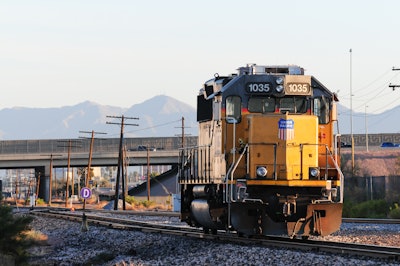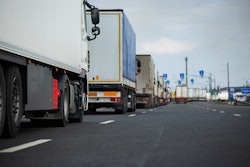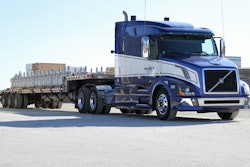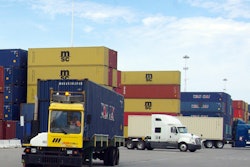
Union Pacific Railroad is launching a new, truck-competitive domestic intermodal service connecting Southern California’s Inland Empire to Chicago, significantly boosting its intermodal capacity.
Set for launch Sept. 3, the new service enhances Union Pacific's connection from the Los Angeles Basin's most active warehouse district through its Inland Empire Intermodal Terminal (IEIT) directly to Chicago's Global 2 Intermodal Terminal.
“As we continue expanding IEIT, this service will deliver consistent, reliable and truck-competitive transportation, challenging the norms of over-the-road shipping and competing head-to-head with team driver truck services,” said Kenny Rocker, executive vice president-Marketing and Sales, Union Pacific Railroad.
With more than 32,000 miles of track in 23 states across the western two-thirds of the United States, Union Pacific Railroad is among the largest transportation companies in the world. With its new service, the company is promising 20% faster intermodal service compared to current industry offerings between these locations, with three days' transit. The service will start at five days a week with the ability to increase with growth.
Rocker in a call with analysts last month noted the company intends to introduce a seven-day a weekly service from Tacoma into Chicago and a seven-day weekly service from Memphis to Dallas. The company on Thursday opened its newest intermodal terminal in Kansas City, Kansas – the fourth intermodal facility Union Pacific has opened since 2021.
On-highway shift to rail
 Union Pacific says its new Kansas City terminal will serve both domestic and international containerized shipments of grains, consumer goods, refrigerated products, and auto parts in the Midwest region, and will help to convert more truck traffic to rail.
Union Pacific says its new Kansas City terminal will serve both domestic and international containerized shipments of grains, consumer goods, refrigerated products, and auto parts in the Midwest region, and will help to convert more truck traffic to rail.
Trucks move more than 70% of the nation's freight but that share has been targeted by rail companies for the last several years. Even trucking companies like Schneider and J.B. Hunt have pledged to move more truck freight via rail.
"The more we can move off of highways onto our railroad, the more we allow our customers to be able to win in the marketplace," CEO and Director Vincenzo James Vena said on the call with analysts.
Schneider (CCJ Top 250, No. 6) in 2023 completed the transition of its western rail operations to Union Pacific as part of company’s plans to double the size of its intermodal business by 2030 and continue to reduce its carbon footprint.
In its U.S. Freight Transportation Forecast, the American Trucking Association expects intermodal rail tonnage will grow by 2.9% through 2030, and then 2.8% between 2031 and 2035. However, ATA forecasts the overall share of freight tonnage moved by railroads will fall from 10.6% in 2024 to 9.9% in 2035, mostly due to declines in coal volume.
Union Pacific's intermodal volumes continued to show year-over-year growth and the company has invested more than $1.4 billion since 2020 to support growth and expansion in its intermodal business.
U.S. rail intermodal volume rose 2.4% in July 2025 over July 2024, reversing a 2.9% decline in June, according to the American Association of Railroads. Volume in July 2025 was the second most ever for the month.
Union Pacific Corporation and Norfolk Southern Corporation in July announced an agreement to create America’s first transcontinental railroad – an $85 billion deal that will connect over 50,000 route miles across 43 states from the East Coast to the West Coast, linking approximately 100 ports and nearly every corner of North America.











